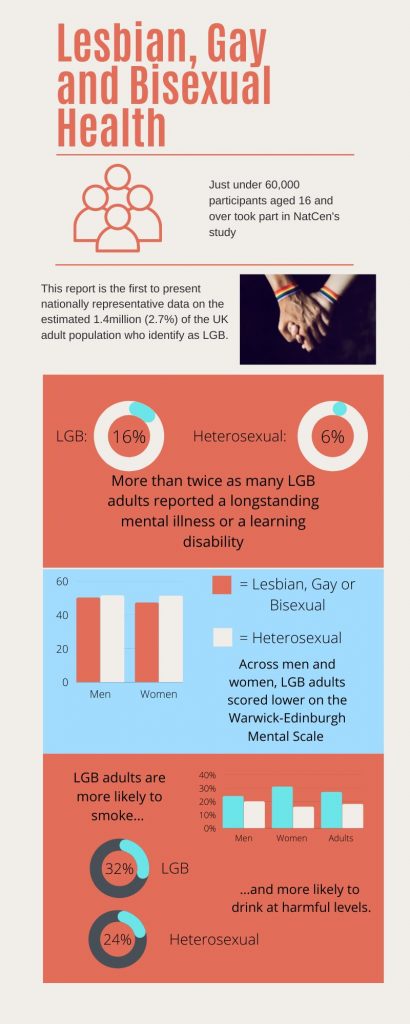A landmark study last month revealed crucial details about the health of lesbian, gay and bisexual (LGB) adults in England – including that homosexual people were more than twice as likely to have mental health issues.
The NHS Digital study, conducted by the National Centre for Social Research (NatCen), drew from over 60,000 participants over 2011-2018 to produce the first nationally representative study of LGB health in the UK.
With LGBT people disproportionately affected by the coronavirus pandemic, this study sheds light on the problems that need addressing to reduce the health gap between heterosexual and homosexual adults.
One of the key findings was that 16% of LGB adults reported a long-term mental, behavioural or neurodevelopment disorder – compared with only 6% of heterosexual adults.
Elizabeth Rochester, 24, from Putney, identifies as queer and suffers from depression.
She said: “I wasn’t surprised by the results of the study.
“The struggles that come with being a gay person are going to impact the way you see yourself.”
LGB adults also had a lower average mental well-being score on the Warwick-Edinburgh Mental Wellbeing Scale of 48.9, compared with heterosexual adults’s 51.4.
LGB women reported the lowest well-being scores, with a rating of 47.3.

The Warwick-Edinburgh Mental Wellbeing scale asks participants to fill out a form indicating their recent experience of their mental health, and was developed by a panel of experts from a range of academic backgrounds.
Miss Rochester stated that the way that LGB people are viewed in society is a key factor in causing the mental health problems seen in the study.
“Some families aren’t accepting, and you have religion, and the way people see you when you’re outside,” she said.
“You can’t just walk down the street with your partner, you’re always second-guessing yourself.
“You have to ask yourself, is it okay to hold hands here, or are people going to be weird about it?”
While this study represents the first to look at LGB health nationally, it is far from the first to identify the struggles that can arise from being part of LGBT+ community in society.
For instance, the Government Equalities Office’s 2018 National LGBT survey found that in the 108,100 responses from LGBT+ people, 40% of them had experienced a negative incident in the last 12 months due to their sexuality.
These incidents most commonly took the form of verbal abuse, and 91% of respondents either didn’t report the incident or didn’t report it themselves, stating that these events happen all the time and they didn’t think anything would change if they reported it.
Studies like these are crucial to identifying the problems facing marginalised groups in society.
NHS Digital’s Chief Statistician Chris Roebuck said: “One of the biggest benefits to collecting and publishing health data is the ability to highlight health inequalities.”
Mental health has been thrust into the forefront of the public consciousness by life under lockdown, prompting the government to announce £500 million Mental Health Recovery Action Plan in March of this year, followed by an extra £40 million in June for young people’s mental health services.
Paul Farmer, Chief Executive of mental health charity Mind, supported the government’s announcement, but added: “The true scale of the nation’s mental health is only beginning to emerge.
“It could be many months or even years before we fully recognise the pandemic’s toll on our collective wellbeing.”
Further findings from the NatCen study included that LGB people were more likely to drink at harmful levels and smoke, but were less likely to be obese.
Featured image by AllGo – An App For Plus Size People on Unsplash




